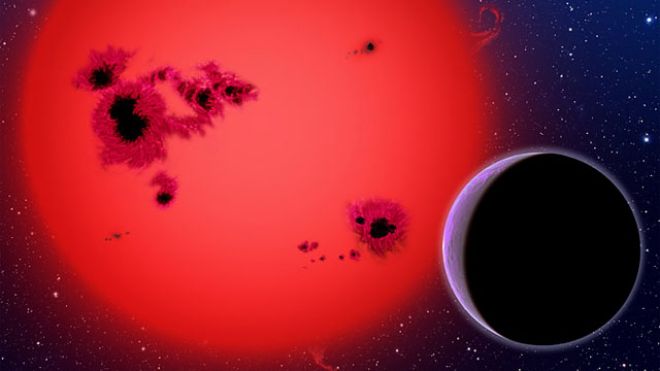
Thanks to NASA’s Hubble Space Telescope, the existence of a new type of planet has been confirmed, Fox News reports.
The world has been identified as GJ 1214b and after analyzing it astronomers have discovered that it is an Earth-like super-planet located outside of our solar system. Astronomer Zachory Berta added that he and his team think that it is a unique water-based planet.
Our solar system contains three types of planets: rocky and terrestrial like Earth, gas giants like Jupiter and Saturn, and then ice giants like Uranus and Neptune.
However, GJ 1214b, is not like any planet from our solar system.
“GJ 1214b is like no planet we know of,” said Berta, from the Harvard-Smithsonian Center for Astrophysics when he spoke to Fox News. He continued to describe the planet, “A huge fraction of its mass is made up of water.”
“If you want to describe in one sentence what this planet is, it’s a big, hot ocean,” Harvard University astronomer David Charbonneau said to Wired in 2009 when the planet was originally found, thank to the MEarth Project, an NSF-funded, robotic observatory located in Arizona.
The planet is too far away and cannot be seen directly, so researchers have been inferring its characteristics through distortions in light. As a result, Berta and his team of experts have been able to deduce that the planet has a thick, steamy atmosphere.
“We’re using Hubble to measure the infrared color of the sunset on this world,” Berta explained to Fox News. He realized that GJ 1214b was featureless and therefore had a dense atmosphere composed of water vapor.
“The Hubble measurements really tip the balance in favor of a steamy atmosphere,” he said.
Thus, the planet is a water world that is very different from Earth. The atmosphere is almost ten times thicker than our own, creating extreme atmospheric pressures making it difficult for light to get through.
“The high temperatures and high pressures would form exotic materials like ‘hot ice’ or ‘superfluid water’ — substances that are completely alien to our everyday experience,” Berta said.
Since it is difficult for light to get through the atmosphere it is unlikely that there is any life on the planet.
“I don’t want to imply that there’s any indication of life as we know it. It might have life, but it would have to be a strange kind of life,” Charbonneau said to Wired and continued, “This planet will occupy us for years. That’s part of what’s so exciting about it.”
































